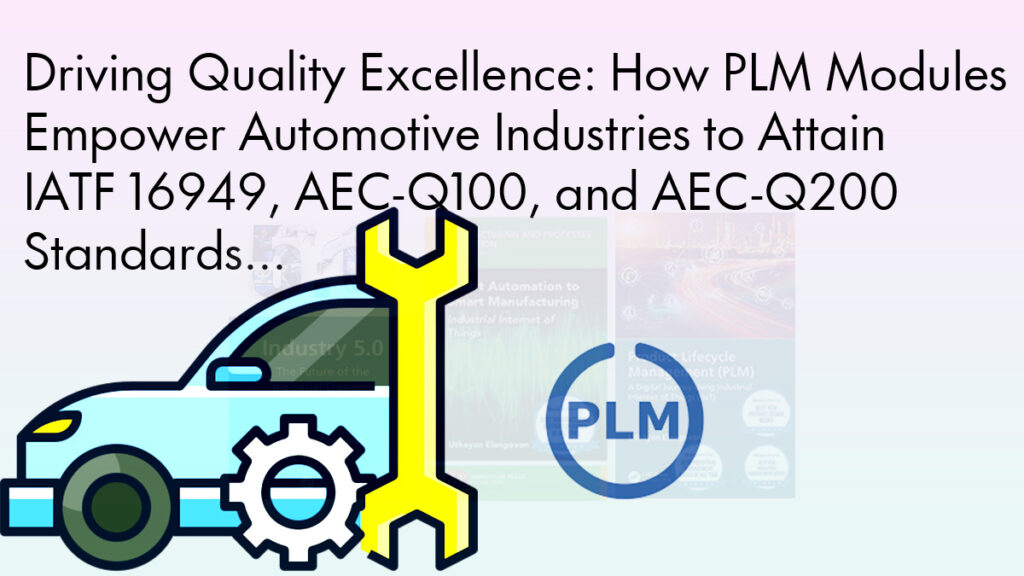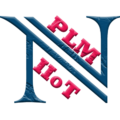Discover how PLM drives quality excellence in the automotive industry. Explore the powerful impact of Product Lifecycle Management on optimizing processes, enhancing collaboration, and achieving superior quality standards.

- Introduction:
- PLM in Automotive Industries
- Understanding IATF 16949 and Its Impact on PLM Implementation
- Leveraging Six Sigma and World Class Manufacturing with PLM
- Embracing Lean Manufacturing Principles with PLM
- The Role of PLM in Toyota Production System (TPS)
- Implementing PPAP and APQP with PLM
- PPAP Using PLM:
- Conclusion:
Introduction:
In the fiercely competitive landscape of the global automotive industry, maintaining exceptional quality standards is paramount for success. Small, medium, and large manufacturing enterprises alike face numerous challenges in their pursuit of excellence, including meeting stringent industry-specific standards such as IATF 16949, AEC-Q100, and AEC-Q200. To achieve these quality benchmarks and optimize their New Product Development (NPD) and New Product Introduction (NPI) processes, automotive industries can leverage various PLM (Product Lifecycle Management) modules. This article explores how these PLM modules, in conjunction with methodologies like Six Sigma, World Class Manufacturing, Toyota Production System, Lean Manufacturing, PPAP, and APQP, empower automotive manufacturers across the globe.
PLM in Automotive Industries
PLM is a strategic approach to manage a product’s entire lifecycle, from ideation to disposal. PLM solutions provide a collaborative platform, integrating people, processes, business systems, and information to streamline operations, enhance innovation, and ensure compliance with quality standards.
Understanding IATF 16949 and Its Impact on PLM Implementation
IATF 16949 stands as a widely acknowledged quality management standard meticulously crafted to cater exclusively to the automotive sector. Compliance with this standard is vital for automotive manufacturers, as it enhances product consistency, reduces defects, and fosters continuous improvement. To meet IATF 16949 requirements effectively, PLM modules play a significant role:
- Configuration Management: PLM enables the management of product configurations, ensuring consistency across all stages of the product lifecycle. This helps in maintaining compliance with IATF 16949’s stringent change control and documentation requirements.
- Traceability: PLM allows complete traceability of product data, components, and processes, facilitating compliance with IATF 16949’s traceability mandates for defect investigation and recalls.
- Risk Management: PLM enables risk analysis and management, an essential aspect of IATF 16949 compliance. It ensures manufacturers identify and mitigate risks related to product design, manufacturing processes, and supply chain management.
Leveraging Six Sigma and World Class Manufacturing with PLM
Six Sigma operates as a data-driven approach aimed at enhancing processes and minimizing variations. World Class Manufacturing (WCM) aims to create a production environment with zero waste, zero defects, and zero accidents. PLM can synergize with these methodologies to deliver exceptional results:
- Data-Driven Decision Making: PLM provides real-time access to data, facilitating evidence-based decision-making in line with Six Sigma principles.
- Continuous Improvement: PLM supports collaboration and feedback loops among teams, fostering a culture of continuous improvement as advocated by Six Sigma and WCM.
- Waste Elimination: PLM helps in identifying non-value-added activities and eliminating waste in the product development process, aligning with WCM’s waste reduction objectives.
Embracing Lean Manufacturing Principles with PLM
Lean Manufacturing focuses on maximizing customer value while minimizing waste. Integrating Lean principles with PLM delivers several benefits:
- Streamlined Workflows: PLM optimizes workflows, ensuring smoother processes and reducing time wasted on non-essential tasks.
- Inventory Control: PLM facilitates accurate demand forecasting, enabling manufacturers to maintain optimal inventory levels as per Lean principles.
- Value Stream Mapping: PLM aids in visualizing the product development process, identifying bottlenecks, and streamlining operations to improve overall efficiency.
The Role of PLM in Toyota Production System (TPS)
Toyota Production System (TPS), known for its efficiency and excellence, can be further empowered by PLM in the following ways:
- Just-In-Time (JIT) Manufacturing: PLM supports real-time collaboration and information sharing, ensuring timely availability of resources as per JIT requirements.
- Jidoka (Autonomation): PLM assists in automating repetitive tasks, freeing up resources for more critical decision-making tasks.
- Andon and Poka-Yoke: PLM can integrate quality checks and error-proofing mechanisms, aligning with TPS’s Andon and Poka-Yoke principles.
Implementing PPAP and APQP with PLM
Production Part Approval Process (PPAP) and Advanced Product Quality Planning (APQP) are essential components of automotive quality management. PLM helps in successful execution:
- Document Management: PLM provides a centralized repository for all PPAP and APQP documents, ensuring accessibility and version control.
- Collaboration: PLM facilitates cross-functional collaboration during PPAP and APQP activities, improving efficiency and reducing communication gaps.
Lets have a look on how PPAP is implemented via PLM
PPAP (Production Part Approval Process) is a critical quality management methodology used by automotive manufacturers to ensure that production parts meet the desired specifications and quality standards. Integrating PPAP within a PLM system streamlines the process and brings numerous benefits to automotive industries. Let’s explore an example of how PPAP can be effectively maintained in PLM and the advantages it offers:
Example: NSC Automotive Inc.
NSC Automotive Inc. is a medium-sized automotive manufacturer, producing various components for well-known automotive brands. The company recently won a contract to supply a critical electronic component to a leading car manufacturer. To meet the stringent requirements of the contract and comply with the customer’s quality standards, XYZ Automotive Inc. needs to follow the PPAP process effectively.
PPAP Using PLM:
NSC Automotive Inc. decides to implement a PLM system to manage its product development and ensure quality compliance. The PLM system is designed to accommodate the PPAP process seamlessly. Key steps in integrating PPAP in PLM are:
a. PPAP Document Templates: The PLM system comes with pre-defined PPAP document templates, including the Design FMEA, Control Plan, Process Flow Diagram, and others. These templates ensure consistency and standardization throughout the PPAP process.
b. Centralized Data Management: The PLM system acts as a centralized repository for all PPAP-related data and documents. This ensures that all relevant stakeholders have access to the latest information in real-time, reducing the risk of using outdated documents.
c. Cross-Functional Collaboration: The PLM system enables cross-functional collaboration between design, engineering, manufacturing, and quality assurance teams. Everyone involved in the PPAP process can collaborate efficiently, making it easier to address issues and resolve challenges promptly.
d. Workflow Automation: The PLM system automates the PPAP workflow, triggering notifications and reminders at each stage. This automation minimizes manual errors, ensures timely completion of tasks, and enhances overall process efficiency.
Conclusion:
In conclusion, the convergence of PLM modules with various quality methodologies enables automotive industries, regardless of their size, to attain and maintain high-quality standards like IATF 16949, AEC-Q100, and AEC-Q200. The integration of Six Sigma, World Class Manufacturing, Lean Manufacturing, Toyota Production System, PPAP, and APQP with PLM establishes a robust framework for driving quality excellence in the NPD/NPI process. As automotive manufacturers continue to navigate dynamic market challenges, adopting PLM modules and quality methodologies becomes essential for sustainable success in the ever-evolving industry.
Ready to take your business to the next level with NeelSMARTEC’s PLM services? Unlock the potential of OpenBOM PLM for SMEs and Windchill PLM for Discrete Manufacturers. Explore our comprehensive publications to dive deeper into PLM, Industry 4.0, and Industry 5.0. Empower your future with NeelSMARTEC – Let’s shape innovation together!

